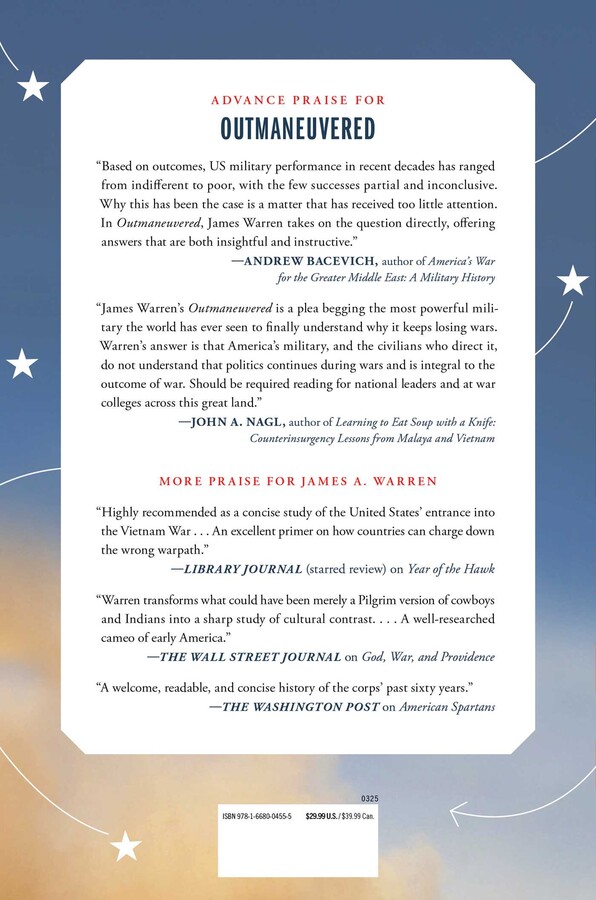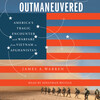Plus, receive recommendations and exclusive offers on all of your favorite books and authors from Simon & Schuster.
Outmaneuvered
America's Tragic Encounter with Warfare from Vietnam to Afghanistan
Table of Contents
About The Book
Since the early 1960s, the United States has fought in four major wars and a cluster of complicated and bloody irregular warfare campaigns. The majority have ended in failure, or something close to it. Why has the US been so ineffective, despite the American armed forces being universally recognized as the best in the world?
Most scholars and analysts believe that the primary cause of our abysmal war record since Vietnam has been the US military’s overwhelmingly conventional approach to conflict, which favors kinetic operations, highly mobile precision firepower, and sophisticated systems of command and control. Here, James Warren argues that a much more formidable obstacle to success has been pervasive strategic ineptitude at the highest levels of decision-making, including the presidency, the national security council, and the foreign policy community in DC.
Time and time again, American presidents have committed military forces to operations in foreign countries whose politics and cultures they did not fully understand. Presidents of both political parties, including Johnson, Reagan, Bush, Clinton, and Obama have overestimated the capacity of US forces to alter the social and political landscape of foreign nations, and underestimated the ability of insurgents and terrorists to develop effective protracted war strategies that, in time, sap Washington’s will to carry on the fight.
In the War on Terror, Warren asserts that senior military officers have been complicit in extending bankrupt strategies by refusing to speak truthfully about them to their civilian bosses. So have the American people, who lost interest in the conflicts in Afghanistan and Iraq, and refused to press their president and congress to bring an end to two futile conflicts. Warren advocates for a less hubristic foreign policy and a broader conception of warfare as a political and military enterprise.
For readers of political, military, and US history—as well as anyone interested in international relations and geopolitical strategy—this book offers unparalleled insights into America’s prior—and potentially future—military conflicts.
Product Details
- Publisher: Scribner (March 4, 2025)
- Length: 336 pages
- ISBN13: 9781668004555
Browse Related Books
Raves and Reviews
"A brilliant analysis of failed U.S. military crusades. . . . Persuasive in every particular, Outmaneuvered is a scathing indictment of arrogance, ineptitude and appalling naïveté, exposing misguided actions across six decades of U.S. administrations in the theater of irregular war . . . Outmaneuvered should haunt every American and give us pause, for we too have been complicit." —Charleston Post and Courier
"An admirable must read for military and foreign policy history buffs." —Booklist
"A searing indictment of overweening arrogance, strategic ineptitude, and criminally wishful thinking, Warren’s latest book is a persuasive account, equal parts maddening and heartbreaking, of misguided actions across 60 years of U.S. administrations in the theater of irregular war, the repercussions of which will be felt for years to come . . . A long-overdue call for American restraint and humility in international affairs." —Kirkus Reviews
"Based on outcomes, US military performance in recent decades has ranged from indifferent to poor, with the few successes partial and inconclusive. Why this has been the case is a matter that has received too little attention. In Outmaneuvered, James Warren takes on the question directly, offering answers that are both insightful and instructive." —Andrew Bacevich, author of America's War for the Greater Middle East: A Military History
"James Warren's Outmaneuvered is a plea begging the most powerful military the world has ever seen to finally understand why it keeps losing wars. Warren's answer is that America's military, and the civilians who direct it, do not understand that politics continues during wars and is integral to the outcome of war. Should be required reading for national leaders and at war colleges across this great land." —John Nagl, author of Learning to Eat Soup with a Knife: Counterinsurgency Lessons from Malaya and Vietnam
Resources and Downloads
High Resolution Images
- Book Cover Image (jpg): Outmaneuvered Hardcover 9781668004555
- Author Photo (jpg): James A. Warren Photograph by Molly Slater(0.1 MB)
Any use of an author photo must include its respective photo credit










